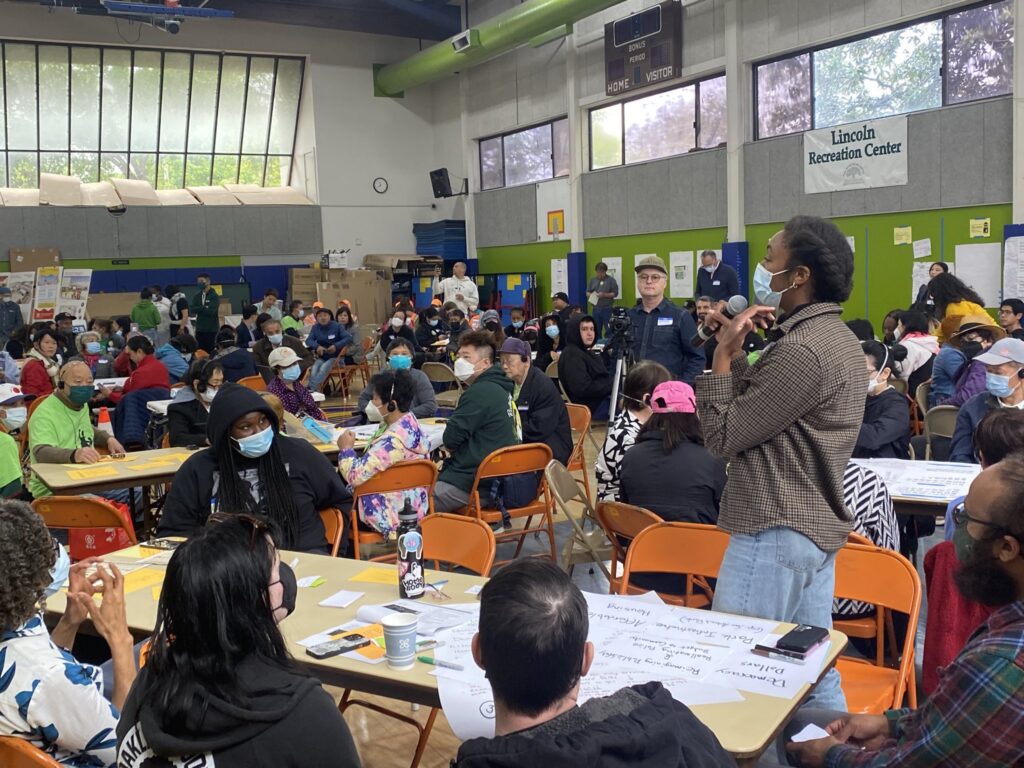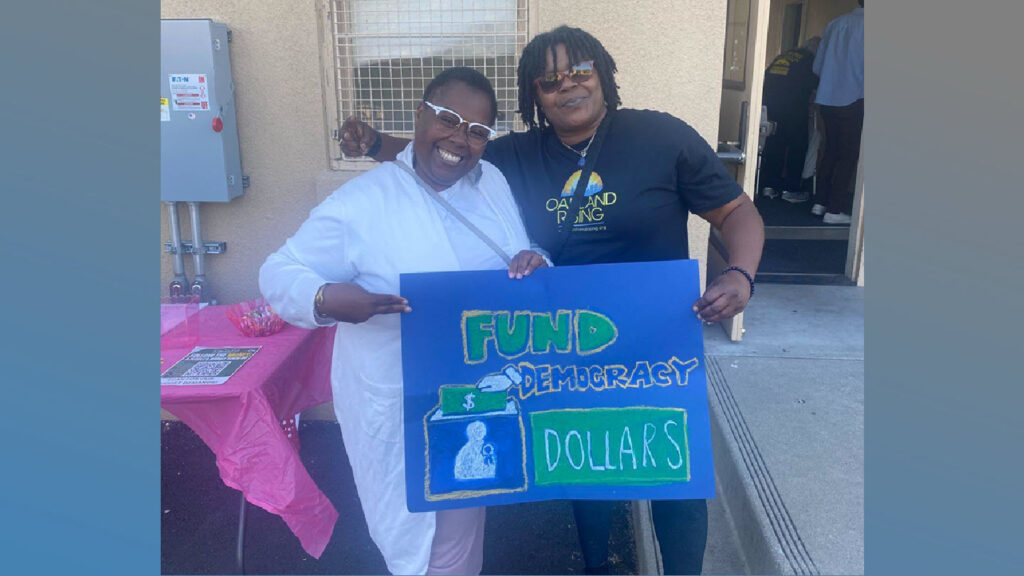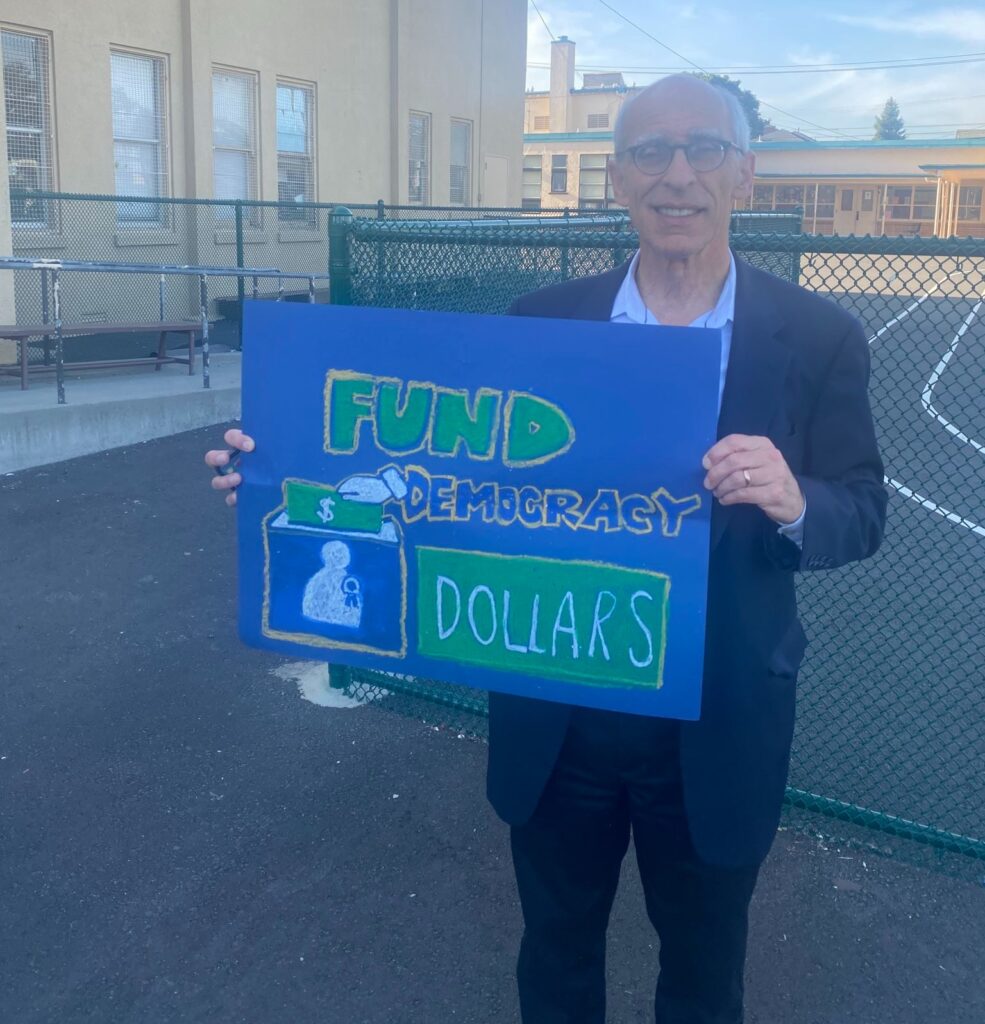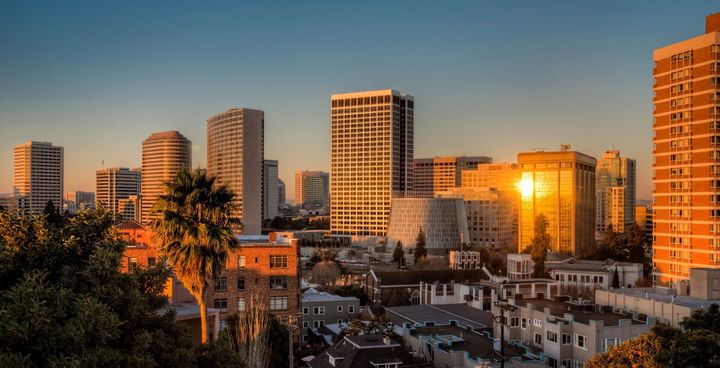In November of last year, Oakland voters approved an innovative public campaign financing program known as “Democracy Dollars” for city elections. The program was the centerpiece of the Oakland Fair Elections Act, on the ballot as Measure W, which passed with 74% in favor.
But the launch of Oakland’s democracy dollars for the 2024 election cycle is jeopardized under new Mayor Sheng Thao’s proposed budget, unveiled on May 1 in response to a deficit caused by a decline in tax revenues. The mayor’s $4.2 billion two-year budget plan would postpone funding for the democracy dollars program until the 2026 election cycle—specifically, by withholding $4 million in funding for redeemable vouchers meant to come from the general fund.
Commissioners of the Oakland Public Ethics Commission, the independent body readying to administer the public campaign financing program, made the case in an op-ed that delaying the rollout of the democracy dollar program would be a mistake, weakening trust in local government during a budget crunch.
Because Measure W replaced the program that reimbursed City Council candidates for limited amounts of campaign expenses, next year’s Oakland elections would entirely lack an option for campaigns to draw on public funding, if the program is postponed.
We need elected officials who are really willing to listen to the community, and Democracy Dollars was going to be the program that would help us.
liz suk, executive director, Oakland Rising
While input from the mayor, city staff, city task forces, and residents all shape the budget in a monthslong process, ultimately the Oakland City Council approves the final budget, which is due by June 30. Recognizing the constraints of the deficit, Oakland advocates for democracy dollars are proposing the Council fund a scaled-back pilot program that would bring its two-year cost down from approximately $8 million to $3.2 million, laying the groundwork for a full rollout in 2026.
Organizations that supported Measure W as it became law, including the Bay Rising coalition of community-led groups and good government group California Common Cause, are contacting Oakland City Council members to urge them to fund the democracy dollars pilot. Over the past week, all but one of Oakland’s seven council districts held town halls, and members of the grassroots groups attended each to emphasize how democracy dollars stand to boost participation in city races.

Oakland’s democracy dollars plan is modeled on the first-of-its-kind program in Seattle, which is growing in use by voters there over the past three election cycles. Under Oakland’s democracy dollars program, four $25 vouchers are to be mailed to every registered city voter, which can be donated to participating city candidates who must reach a qualifying threshold of small-dollar contributions and agree to other requirements.
In 2024, elections will be held for city attorney, five city council seats, and four school board seats. Supporters in Oakland’s Yes on W coalition point to the voucher program’s ability to broaden the donor pool, increasing local engagement in elections and enabling candidates who don’t already have a rolodex of wealthy supporters to run for city office.
Oakland Rising’s executive director, liz suk, told Sludge, “There’s going to have to be tightening and some cuts that need to be made. But in November, Oaklanders voted overwhelmingly yes on Measure W, which is supposed to create a more transparent and accountable government by offering folks and establishing a democracy dollars program—the second in the country. It’s an opportunity to get elected officials into office that will hopefully bring local government attention to the issues that matter most to us, like affordable housing, quality schools, community safety—not just pouring all our funds into the police department.
“Oakland voters really wanted to see this program in place,” suk said. “We know that we’re in a city up against some major issues like housing and homelessness. The streets and infrastructure in the city haven’t been taken care of by previous administrations. In order to have those in place, we need elected officials in office who are really willing to listen to the community, and democracy dollars was going to be the program that would help us.”
Oakland Rising is encouraging local supporters of democracy dollars to attend council district budget meetings and keep the program’s rollout on schedule. “Folks are going to each of the town halls and talking directly to each of the council members about what it could look like to fund this program,” suk said.
Working with the Public Ethics Commission, suk said, “We’ve come up with different options to have at least a partial launch of the program, where democracy dollars would be housed in the administration and would be prepared for it to launch. As we press on the City Council, we’re hoping to garner more support for democracy dollars and seed the funding for the public education that’s needed.”

“In the large scheme of things, a bit over $1 million a year is not a big chunk of funds,” suk said. “This will be vital for us to begin the process of turning our city into one that will be able to prioritize the voices of communities and promote their needs to our elected officials.”
Jonathan Mehta Stein, executive director of California Common Cause and an Oakland resident, told Sludge, “Our city’s leaders need to honor the will of the people and find a way to implement a successful partial launch of the democracy dollars program in 2024 so that Oakland can be a statewide leader in building an inclusive and multiracial democracy.
“Oaklanders made it clear it’s a top priority for us to have a more accountable and responsive local government, and the City Council needs to act accordingly by providing seed funding for a pilot launch of the democracy dollars program in 2024,” Stein said. “Everyone supporting this effort are Oaklanders ourselves and we recognize it’s a difficult budget environment, so we’re not asking for a full launch—we’ve found a way to design a partial launch that would still be very effective for $3.2 million over two years. That’s less than one half of one percent of the city’s general fund and our hope is that the mayor and the City Council can find the funds necessary to honor the will of the voters.
“We’re pleased to see that the mayor’s budget finds a way to address needs like affordable housing and public safety while dealing with the budget deficit, but unfortunately the budget takes us backwards on public financing, because Measure W replaced the limited public financing act with democracy dollars,” Stein said. “If Measure W is delayed, the Limited Public Financing Act remains stricken from city law, so in effect we end up worse off than before, with a democracy that is more open to wealthy campaign donors, special interests, and candidates who have connections to those wealthy interests. That’s clearly not what Oaklanders wanted when they voted yes on the Fair Elections Act.”
A report last year by the civic technology nonprofit MapLight found that campaign contributions came disproportionately from Oakland’s richest and whitest neighborhoods. The analysis also found that just half of all candidate fundraising came from Oakland residents, with outside spending by companies like Lyft and wealthy donors like billionaire Mike Bloomberg playing a significant role in city elections. In last year’s Oakland mayoral race, a pop-up committee funded by hedge fund and real estate executives with interest in developing a coal export terminal promoted one candidate, a former councilmember, under the anodyne-sounding name, “Californians for Safer Streets Supporting Ignacio De La Fuente.”
Stein said that members of the Yes on W coalition are emailing councilmembers and turning out to community town halls to back the pilot program. “We are showing up with the same message: we recognize full funding is not possible, we want a very modest amount in the budget to implement a pilot launch to take advantage of the momentum that democracy dollars has and show that Oakland can be a leader,” Stein said.

Oakland Councilmember Dan Kalb, a supporter of Measure W, said in a statement, “Democracy Dollars is a vitally important program to engage more residents in the political process and open that process up to a greater range of candidates. I’m happy to enthusiastically support this in Oakland and beyond.”
A research study of Seattle’s latest use of democracy vouchers published last year by Associate Professors Dr. Jen Heerwig of Stony Brook University and Brian J. McCabe of Georgetown University found that the program’s largest share in gains since its launch in 2017 came in participation among people of color, younger voters, and lower-income residents, helping the city’s donor pool become more representative of the city’s population as a whole.
In Los Angeles, where a group has been campaigning since 2021 for a public campaign voucher program to combat the wave of outside spending in city elections, several City Council members introduced a motion in March to study the feasibility of a version of the program in their city. This week, the Los Angeles City Council’s Rules Committee scheduled the motion for a public hearing on Friday, May 26. The text of the motion directs city officials to produce, within 90 days, a demographic and neighborhood-by-neighborhood analysis of donors in Los Angeles elections, as well as recommendations for how much the program would increase the share of campaign donations coming from city residents and budget requirements for the program, among other things.
At Oakland’s Council District 2 budget forum, city resident Kara Murray-Badal said in a video taken by Oakland Rising, “We’re here because we care so much about affordable housing, about safety and making sure that our people are treated well, and we know that democracy dollars are a key way to make sure that happens.
“It’s about free and fair elections, we shouldn’t wait on that priority,” Murray-Badal said to the town hall.

